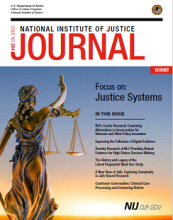Digital evidence
Just Science Podcast: Just Solving a Hit-and-Run in Sin City
Just Science Podcast: Just Digital Forensics Program Development and Outlook
"It was a joke:" Patterns in girls' and boys' self-reported motivations for digital dating abuse behaviors
Digital Evidence in Criminal Cases Before the U.S. Courts of Appeal: Trends and Issues for Consideration
Continuation and Expansion of DCCI Stegextraction Project
Continuation and Expansion of DCCI Stegextraction Project
Continuation and Expansion of DCCI Stegextraction Project
Continuation and Expansion of DCCI Stegextraction Project
Improving the Collection of Digital Evidence
Two NIJ-funded projects introduce new methods and tools for collecting and processing digital evidence in cases involving child sexual abuse materials and large-scale computer networks.
NIJ Funds Almost $17M in Forensic Science Research and Development
NIJ announced almost $17 million in funding to support 36 forensic science research and development projects in fiscal year 2020 under its Research and Development in Forensic Science for Criminal Justice Purposes (Forensic Science R&D) program. Through its R&D grant funding, NIJ continues to advance the speed, accuracy, and reliability of forensic analysis, which ultimately bolsters the administration of justice.
“Since the 2009 NAS report...
Transfer, Persistence and DNA Source Attribution of Trace Biological Material in Digital Penetration Assault Cases
Landscape Study of Digital Tools to Identify, Capture, and Analyze Digital Evidence in Technology-Facilitated Abuse Cases
How do prosecutors decide to drop or press charges in stalking cases?
Improving the Collection of Digital Evidence
NIJ Journal Issue No. 284: Focus on Justice Systems
Remote Methods for Volunteering Digital Evidence on Mobile Devices
Enhancing the Capacity, Capabilities, and Validity of U.S. Forensic Laboratories
Enhancing the Capacity, Capabilities, and Validity of U.S. Forensic Laboratories
Enhancing the Capacity, Capabilities, and Validity of U.S. Forensic Laboratories
Improving Evidence Management: Best Practices for Handling, Preservation, Retention, and Tracking
Expanding Research to Examine the Impacts of Forensic Science on the Criminal Justice System
In 2004, the National Institute of Justice created the social science research on forensic sciences (SSRFS) research program to explore the impact of forensic sciences on the criminal justice system and the administration of justice. Much of the early research from the SSRFS program focused on DNA processing and the use of DNA in investigations and prosecutions.
See the YouTube Terms of Service and Google Privacy Policy




